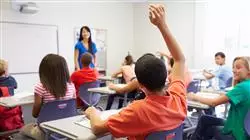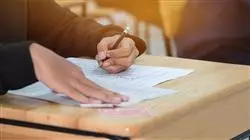University certificate
The world's largest faculty of education”
Description
Develop new communication skills and adapt your teaching methods to the digital age with this prestigious program"

Any attempt at communication requires the speaker to have a complete command of his or her communicative abilities. Therefore, this Postgraduate certificate is based on knowledge of linguistic, sociolinguistic and pragmatic skills. To teach Spanish as a foreign language, it is essential to know all the skills that students must develop and their different learning stages, in order to develop different methodologies adapted to their educational needs.
This Postgraduate certificate will provide teachers with the tools and knowledge they require to practice the profession with confidence and efficiency, enabling them to help their students to understand and analyze messages effectively, and to develop non-verbal communication.
The teacher will be able to explain and resolve confusing grammar issues or questions regarding their student’s assessment process. The teacher will have access to a complete teaching methodology for vocabulary and to different techniques and didactic materials, taught by acclaimed experts in the field with extensive experience in the educational sector.
This program will allow to develop and expand your knowledge and skills related to Spanish lexical competence in teaching. At the end of the program, you will be able to detect frequent errors in teaching spanish and you will have acquired the necessary tools for the prevention and treatment of these errors, so that you will have the necessary skills to work as a teacher of spanish as a foreign language.
With a methodological design based on proven teaching techniques, this course will take you through different teaching approaches to allow you to learn in a dynamic and effective way”
This Postgraduate certificate in Planning, Assessment and Creation of Materials in Spanish as a Foreign Language contains the most complete and up-to-date program on the market. The most important features include:
- The latest technology in online teaching software
- A highly visual teaching system, supported by graphic and schematic contents that are easy to assimilate and understand
- Practical cases presented by practising experts
- State-of-the-art interactive video systems
- Teaching supported by telepractice
- Continuous updating and recycling systems
- Autonomous learning: full compatibility with other occupations
- Practical exercises for self-assessment and learning verification
- Support groups and educational synergies: program questions, discussion and knowledge forums
- Communication with the teacher and individual reflection work
- Content that is accessible from any fixed or portable device with an Internet connection
- Supplementary documentation databases are permanently available, even after the program
With a approach based on the resolution of real situations, this Postgraduate certificate will allow you to apply what you have learned in your daily teaching practice, immediately and with total confidence"
It includes in its teaching staff professionals belonging to the field of education, who bring to this program their work experience, in addition to recognized specialists belonging to reference societies and prestigious universities.
Thanks to its multimedia content developed with the latest educational technology, they will allow the professionals a situated and contextual learning, that is to say, a simulated environment that will provide an immersive learning programmed to train in real situations.
This program is designed around Problem-Based Learning, whereby the professional must try to solve the different professional practice situations that arise throughout the program. For this purpose, the teacher will be assisted by an innovative interactive video system created by recognized specialists in the field of teaching.
Distinguished experts in the field have meticulously designed this Postgraduate certificate, putting all their experience and knowledge in the elaboration of this program"

Our innovative concept of telepractice will provide you with a faster learning process and a much more realistic view of the content"
Syllabus
The contents of this Postgraduate certificate have been developed by different experts with a clear purpose: to ensure that students acquire each and every one of the skills necessary to become true specialists in this field.
A comprehensive and well-structured program that lead you to the highest standards of quality and success.

Get trained wherever and whenever you want, thanks to the online mode of this Postgraduate certificate that allows you to take this program from any electronic device with an internet connection"
Module 1. Planning, Creation and Evaluation of Materials in SFL
1.1. Timing in the Planning of SFL Classes
1.1.1. The Importance of Implementing a Plan with Estimation of Timings
1.1.1.1. The Sense of the Planning Process According to the Estimated Time
1.1.2. Specific and General Objectives in Line with the Plan
1.1.2.1. Proposal of Objectives According to the Type of Action
1.1.2.2. Respecting the Sequence in the Order of Action
1.2. Specific and General Objectives in Line with the Plan
1.2.1. Specific and General Objectives in Line with the Plan
1.2.2. Proposal of Objectives According to the Type of Action
1.2.3. Respecting the Sequence in the Order of Action
1.3. The Steps to Plan: When and Why?
1.3.1. Information Prior to Planning. The Search and Selection The Search and Selection
1.3.2. Reflection on the Order of Steps to Carry Out
1.3.3. Subsequent Modification
1.4. The Uniqueness of the Classroom, Represented in the Detection of Levels
1.4.1. Exchange of Tasks and Other Group Work Techniques
1.4.1.1. Task Session
1.4.2. Particularities of the Students in Terms of the Techniques for Creating Tasks
1.4.2.1. Understand the Student Body as an Entire Complex Entity
1.4.2.2. Type of Task According to the Complexity of the Classroom
1.4.2.3. Particularities of the Students Depending on the Cultural Context
1.5. Particularities of the Students in Terms of the Techniques for Creating Tasks
1.5.1. Particularities of the Students in Terms of the Techniques for Creating Tasks
1.5.2. Understand the Student Body as an Entire Complex Entity
1.5.3. Type of Task According to the Complexity of the Classroom
1.5.4. Particularities of the Students Depending on the Cultural Context
1.6. Content Creation Based on Given Material
1.6.1. Adaptation of Material
1.6.1.1. Study and Learning Guides
1.6.1.2. Selection of Material in Relation to the Support
1.6.1.3. Transformation of Material
1.7. Virtual Environment as a Means of Developing the Syllabus
1.7.1. Media and the Internet: Influence on Learning
1.7.1.1. Use of Standardized Platforms
1.7.1.2. Interactive and Collaborative Environments
1.7.2. New Tools and Support for the Creation of Your Own Material
1.7.2.1. Innovative Applications and Platforms
1.8. New Tools and Support for the Creation of Your Own Material
1.8.1. New Tools and Support for the Creation of Proprietary Material
1.8.2. Innovative Applications and Platforms
1.8.3. Interactive and Collaborative Environments
1.9. Modes and Techniques to Develop to Improve our Material in the Evaluation Process
1.9.1. Contrast and Development Techniques
1.9.2. Benefits of Using Virtual Techniques for Certain Types of Evaluation Tasks
1.10. The Importance of External Evaluation and Third Party Evaluation
1.10.1. Externalization of the Materials Made
1.10.2. Self-Evaluation Applications
1.11. Comparison between the Basic Idea and the Result in the Evaluation
1.11.1. Content Research in Relation to What’s Been Evaluated
1.11.1.1. The Search for Written and Contrasted Support
1.11.1.2. The Degree of Evaluative Susceptibility
1.11.2. Peer Evaluation for Teachers
1.11.2.1. Progression: The Ally of Evaluation
1.11.2.2. How to Identify that our Evaluation isn’t Following the Agreed Pattern?
1.11.3. Content Research in Relation to What’s Been Evaluated
1.11.4. What aspects should be taken into account in order to carry out a progressive evaluation?
1.12. Peer Assessment for Teachers
1.12.1. Peer Assessment for Teachers
1.12.2. Progression: The Ally of Evaluation
1.12.3. How to Identify that our Assessment isn’t Following the Agreed Pattern
1.13. Content Research in Relation to What’s Been Evaluated
1.13.1. Content Research in Relation to What’s Been Evaluated
1.13.2. Data Representation
1.14. Aspects to Consider When Carrying Out a Progressive Evaluation
1.14.1. Aspects to Consider When Carrying Out a Progressive Evaluation
1.14.2. Expectations of Progressive Assessment
1.14.3. Systemization of Progressive Assessment
1.14.4. Assessment Analysis
1.15. What is Innovation in Material Composition?: Development Strategies
1.15.1. Innovation in Education from a General Perspective
1.15.2. How to Ensure that Innovation is Well-Received by the Students
1.15.3. Reinvent and Other Forms of Innovation
1.15.4. Choosing References and Bibliographies in Innovation
1.15.4.1. General Reference Sources
1.15.4.2. Bibliographic Sources
1.16. Choosing References and Bibliographies in Innovation
1.16.1. Choosing References and Bibliographies in Innovation
1.16.2. Classification for Grammatical References
1.16.3. General Reference Sources
1.17. Complement the Institutional Design with Government Regulations, Guidelines and Norms
1.17.1. The Planning Rules Set Forth by the National and European Community
1.17.2. Complement the Institutional Design with Government Regulations, Guidelines and Norms
1.17.3. The Planning Rules Set Forth by the International Community
1.18. Complement the Institutional Design with Government Regulations, Guidelines and Norms
1.18.1. Objectives
1.18.2. Development
1.18.3. The Planning Rules Set Forth by the National and European Community

The teaching materials of this program, elaborated by these specialists, have contents that are completely applicable to your professional experiences"
Postgraduate Certificate in Planning, Assessment and Creation of Materials in Spanish as a Foreign Language
Nowadays, learning Spanish as a foreign language (ELE) has become increasingly important due to the increase in cultural exchange and international job opportunities. Therefore, there is a great demand for highly skilled professionals in teaching ELE around the world. TECH's Postgraduate Certificate in Planning, Assessment and Materials Creation in Spanish as a Foreign Language provides students with a thorough understanding of effective methods for teaching Spanish as a foreign language, teaching planning, assessment and the creation of appropriate teaching materials. The instruction in this university course provides professional opportunities for those interested in working as SFL teachers, SFL teaching program coordinators, teaching materials developers, SFL teaching consultants, and in other roles related to teaching Spanish as a foreign language. In addition, the fact that this course can be studied 100% online provides the flexibility of being able to study from anywhere in the world and adapt the study schedule to the needs of each student.
A unique opportunity for professional growth available at the click of a button
TECH's Postgraduate Certificate in Planning, Assessment and Creation of Materials in Spanish as a Foreign Language will provide you with a wide variety of career opportunities. With the knowledge acquired, you will be able to identify the most effective methods for learning a new language, plan new teaching models and develop tools to promote the learning of Spanish. Studying this Postgraduate Certificate in Planning, Assessment and Creation of Materials in Spanish as a Foreign Language will allow you to adapt your studies to your schedule and needs, as well as access to a wide variety of resources and digital tools that will enrich your learning. In addition, you will have access to specialized teachers and a learning community with whom you can exchange ideas and experiences in real time. Don't miss the opportunity to improve your skills and expand your professional opportunities in the field of teaching Spanish as a foreign language with TECH.







